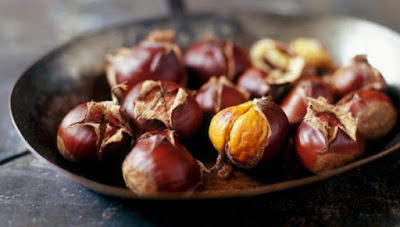Benefits of the chestnut
 |
| source image by: www.bbc.co.uk |
If its richness in vitamins and trace elements makes it the perfect ally of the sport, the benefits of the chestnut are profitable for everyone.
Chestnut and brown: what difference?
The chestnut is the fruit of the wild chestnut.
Brown, we eat in various forms (marron glacé, chestnut cream, turkey with chestnuts, ...), is actually a big chestnut grown, round and without folds of skin inside the flesh. The brown bug contains only fruit that 1, while that of the chestnut comprises 3.
It should not be confused with horse chestnut, poisonous fruit of horse chestnut (or horse-chestnut) that is often found in town.
Chestnut and brown belong to the group of so-called fruit "to husk", that is to say, fruit protected by a solid shell (and usually waterproof).
Intakes of chestnuts
- Carbohydrates (starch 2/3, 1/3 of sucrose)
- Lipids (2/3 of unsaturated fatty acids)
- Protein
- Fibres
- B vitamins (B1, B2, B3, B5, B6, B9, B12)
- Vitamin C
- Vitamin D
- Vitamin E
- Calcium
- Iron
- Magnesium
- Phosphorus
- Potassium
- Copper
- Iodine
- Manganese
- Selenium
- Zinc
Benefits Chestnut Health
- energy source
- prevents blood sugar spikes, that is to say, the sudden rise in sugar levels in the blood (due to its high starch content "resistant", that is to say, which is digested very slowly, incompletely)
- Action against the "bad" cholesterol
- promotes satiety
- protection of the nervous system
- immune protection
- preventing anemia
- Infection Action
- Action against fatigue
- facilitates digestion
- protection against cardiovascular disease
- protection against type 2 diabetes
- muscular and nervous relaxant
How to eat it?
It is best to just eat the grilled chestnuts, Boullie or steam cooked to retain all its assets without adding fat.
It is recommended not to consume more than 10 chestnuts per day (200g).
Cons-indications
Warning: the chestnut can cause food allergies, particularly among peanut allergy sufferers, and children from families where one or more people suffer from food allergy (father, mother, brother, sister) as a precaution, it is recommended to wait until the child is 3 years old to make him eat chestnuts. If proven family food allergy, ask your doctor.
Its high starch content can make the chestnut difficult to digest if it is not properly cooked. Its excessive consumption must sometimes be avoided by people suffering from bloating, colitis and liver diseases. If this is your case, talk to your doctor.
